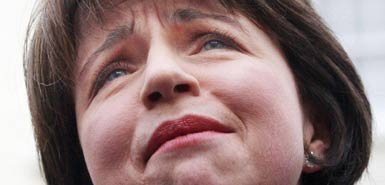Scotland
E-mails will prove that I questioned donations, says Wendy Alexander
 Wendy Alexander, the leader of Scottish Labour, made it clear yesterday that she was staking her political future on e-mails which she says show that she challenged the legality of a donation to her campaign for the post.
Wendy Alexander, the leader of Scottish Labour, made it clear yesterday that she was staking her political future on e-mails which she says show that she challenged the legality of a donation to her campaign for the post.
Ms Alexander, in the leader’s chair for only 11 weeks, said that the e-mails had been “initiated” by her and that she would be making them available to the Electoral Commission, which is investigating all the donations made to her campaign. She was speaking minutes before addressing a meeting of the Labour group at the Scottish Parliament where she is said to have received “clear and overwhelming support” from her MSPs.
Ms Alexander, it has emerged, spoke to Gordon Brown on Sunday about whether she should stay or go. According to sources close to the Prime Minister, he told her: “Of course I want you to stay but you must do what is best for your family.”
Ms Alexander interpreted those words as supporting her view that if she resigned it could be interpreted as an admission of guilt.
The affair broke when Ms Alexander’s campaign team admitted last week that it had broken the law barring overseas donations because it had accepted a £950 donation from Paul Green, a Jersey-based property developer with interests in Glasgow.
Ms Alexander’s team has maintained that she did not know details of the donation and that Charlie Gordon, a member of Ms Alexander’s campaign team and a former leader of Glasgow City council, had misled the team by claiming that the donation was legal because it had been made through a Glasgow-based company owned by Mr Green.
In the Commons yesterday, the Tories attempted to keep the pressure on Labour over the scandal of David Abrahams’s disguised donations. Francis Maude said it was literally incredible that Peter Watt, the former Labour general secretary, who quit over the donations scandal, or Jon Mendelsohn, the party’s chief fundraiser, did not know that the practice of proxy donations was illegal.
But Mr Maude was forced to defend the Conservatives’ own funding arrangements during ill-tempered exchanges in an opposition debate. in which he was pressed to reveal the tax status of Lord Ashcroft, a significant donor to the Conservative Party.
Mr Maude said: “I can confirm unequivocally that any donations made by Lord Ashcroft or any companies associated with him are entirely permissible,” an answer that Jack Straw, the Justice Secretary, described later as “carefully framed”.
The Conservatives, nervous of suffering a backlash over the issue of party donations, also moved to put into the public domain the name of a previously anonymous donor. David Grove was revealed to have joined the Midland Industrial Council, a body that has donated millions to the party.
The decision to name Mr Grove appears to run contrary to the council’s previous policy of not making a public statement on every new member. David Cameron, the Tory leader, gave a commitment that new members of the MIC would be named automatically. The Tories pointed out that Mr Straw had been unable to say whether or not Mr Abrahams’s donation had been returned to him as ministers have previously claimed.
Regrets
November 29
“I have asked for the permissibility of the donation to my election campaign to be checked and we await the outcome of the Electoral Commission’s review”
November 30
“I deeply regret that this situation has occurred. I realise that you will have many questions but it’s a matter for the Electoral Commission”
December 4
“My campaign did not set out to intentionally mislead or break the rules. Mistakes have been made. It would be easy to quit but also wrong”
(Published by Times Online, December 05, 2007)
_____________________